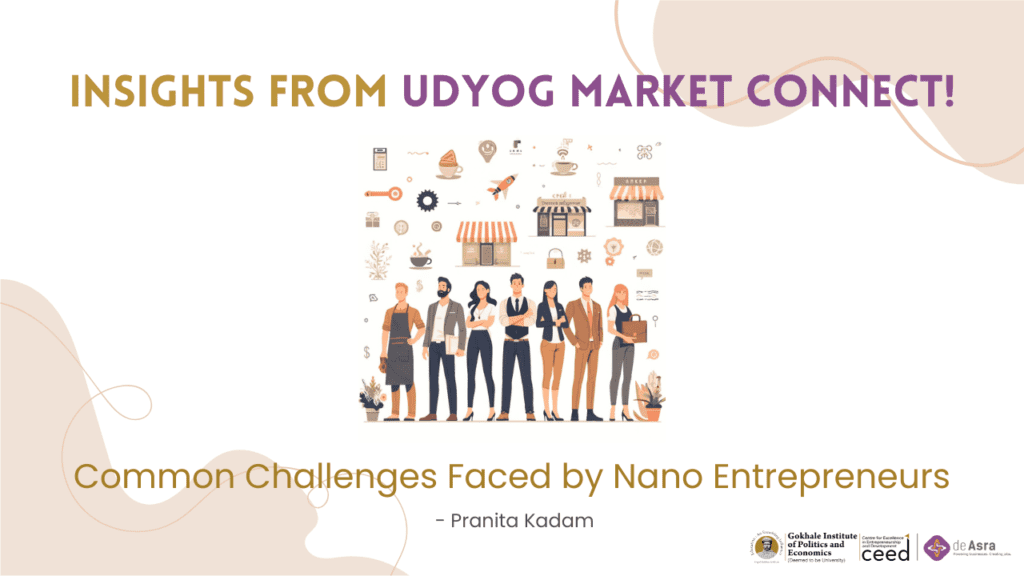The Udyog Market Connect (UMC) program, initiated by the deAsra Foundation, has provided vital support to nano entrepreneurs across diverse sectors, aiming to help them access and optimize market channels. In its first edition, held from April 2023 to November 2023, UMC brought together 51 entrepreneurs who voluntarily registered to participate in this six-month program. They attended group consultation sessions where industry experts guided them in exploring three key market channels to grow their businesses.
Based on semi-structured interviews conducted after the program’s conclusion in 2024, this article delves into the challenges these entrepreneurs face across sectors such as catering, agriculture commodity trading, food processing, and small arts and crafts. The shared struggles reveal common issues: high operational costs, limited market access, reliance on digital platforms, and the pressing need for better training and support. Through the experiences of these nano entrepreneurs, we can gain insight into the obstacles they face and the ways in which the UMC program has helped address some of these challenges.
High Operational Costs of Using E-Commerce
A significant challenge across sectors is the burden of high operational costs. Entrepreneurs in the catering sector face additional expenses from food delivery apps, which charge per kilometer for deliveries and deduct commissions from each sale, limiting profit margins. Similarly, small art and craft businesses encounter high costs in e-commerce, where achieving visibility often requires paying consultants and advertising fees, a strain on smaller budgets.
For those in agriculture, the costs of collecting, sorting, and processing produce can become substantial, especially when attempting to scale. In food processing, exhibition fees can be prohibitively high, which complicates efforts to market value-added products like organic jaggery and millets. Entrepreneurs highlight a preference for establishing B2B relationships over single events, aiming to build consistent partnerships.
Although the program has helped these entrepreneurs access digital platforms and exhibitions, the associated costs often outweigh the benefits. Many expressed a need for more cost-effective avenues to reach their customer base and maintain profitability.
Limited Market Access
Limited market access remains a widespread hurdle. Catering businesses, while benefiting from delivery platforms, find they are still restricted without their own online portals or dedicated delivery systems. Food processing businesses, reliant on direct sales at exhibitions, struggle to scale effectively.
Agriculture commodity traders find it challenging to access direct markets for farm produce and often depend on traditional channels. Small art and craft businesses, dealing in items such as cloth bags and decorative products, struggle to penetrate corporate gifting and export markets, hindered by limited knowledge of export protocols and effective product presentation.
UMC has provided opportunities for entrepreneurs to connect with wider markets, yet many indicate a need for more industry-specific exhibitions and trade fairs that would allow them to engage directly with relevant customers.
Dependence on Digital Platforms
Food processing entrepreneurs are increasingly turning to platforms like WhatsApp for marketing, but their limited awareness of e-commerce options and tax compliance hinders growth. Art and craft businesses also encounter challenges on larger e-commerce platforms, where high advertising fees and consultant costs become prohibitive. Additionally, the return policies on these platforms often lead to damaged goods and financial setbacks.
While UMC introduced participants to digital solutions, many still require more comprehensive training to maximize the benefits of online marketing without incurring excessive costs. Entrepreneurs seek more affordable and effective digital marketing strategies to help them grow their presence online.
Need for Enhanced Training and Support
A shared theme across sectors is the demand for better training, particularly in financial management, marketing, and product presentation. For agriculture traders, guidance in accessing credit and insurance would support business expansion, while food processing entrepreneurs need technical support to meet quality standards.
Art and craft businesses, especially those producing cloth bags, are eager to expand into retail and export markets but need more knowledge about export procedures and corporate sales. The limited awareness of online sales protocols and tax compliance further limits their growth potential.
Though the program has provided technical courses and networking opportunities, many entrepreneurs expressed a need for more targeted training programs in areas such as digital marketing, financial literacy, and export procedures.
Conclusion
The Udyog Market Connect program has significantly contributed to the growth and market access of many nano entrepreneurs by offering critical resources, guidance, and networking opportunities. Yet, challenges such as high operational costs, limited market access, reliance on digital platforms, and gaps in training remain barriers to their success. Addressing these issues through more affordable options, targeted support, and specialized training will empower these entrepreneurs to overcome challenges and thrive in their respective fields.
Pranita Kadam is a Research Assistant in Gokhale Institute of Politics and Economics and works as a Consultant with CEED.






